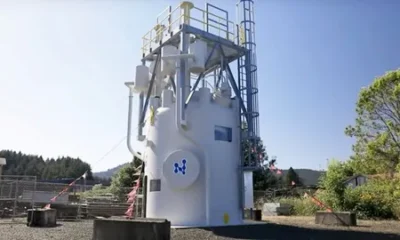Technology
Why Do We Need Data Center? Importance, Uses, Benefits, Purpose

In most of the cities, our life relies on the functioning and availability of one or multiple data centers. It is not an overstatement. Most of the things in every segment of human activity such as energy, lighting, telecommunications, internet, transport, urban traffic, banks, security systems, public health, entertainment and even our physical integrity are controlled by data centers.
In brief, the welfare and security of billions of human beings is passed on to these centers of control and supervision of data and information. Most common people may not worry too much about it. However, big corporations and public institutions, on the other hand, have a responsibility to act seriously against such matters. You Can Also Check Out Full Lists Of Data Centers In Nigeria Here
A break of these data centers would prevent us completely from sending a simple query to Google, since this giant portal holds more than 700 trillion pages of information on thousands of data centers around the globe. Usually, people prefer to avoid thinking about the issue, as according to them, nothing can be done to change the situation.
What is a Data Center?
Data center comprise two keywords which are “Data” and “Center“. Whilst Data means raw materials or A representation of facts or ideas in a formalized manner capable of being communicated or manipulated by some process, “Center” also means An area that is approximately central within some larger region.
Wherefore, Data Center means Facility used to house large networked computer systems and associated components, e.g. for distribution of data or providing cloud computing services.
We can however still say;
Data center is a centralized location rendered with computing resources and crucial telecommunications – which includes servers, storage systems, databases, devices, access networks, software and applications. These things are controlled by highly trained personnel to use and to control industry, government and company services. A few years back, the data center was considered as one of the greatest villains of the environment, by its absurd power consumption and the skyrocketing costs of operating.
However, today, the scenario is much different. The new age data centers are much smaller and modular. This is the big corporate trend, the modular growth. I believe they still have a long life cycle, but its expansion appears in a modular fashion. Same as corporations searched the modularity of the desktop to the mainframe, so does the data center.
The modern data centers consume much less power and occupy much less space. Their growth depends on the demand for services. They grow as the demand for services grows. Basically, they are born small and count on the energy consumption, carbon emissions and global warming. The sustainability and its effect on the environment is a real concern, though there are more positive results for the companies themselves, within the philosophy of “green technology”.
If compared with old data centers, these new modern data centers have four times higher processing capacity and occupy only 40% of the space. Strictly saying, it is not because of the reduction of components, but due to the ongoing research for the overall system efficiency, which consists of the concepts of virtualization and cloud computing.
Also, compared to the old data centers, new data centers have larger capacity to store data and information in racks, as in old days it was too difficult to cool them down. Latest and advanced technologies not only enable increase in density, but also ensure better cooling due to which modern data centers occupy minimum space. The overall system efficiency can also be increased in other ways, as multi-zones are available with specializing in high, medium and low level of processing.
Another important and major trend in data centers is the inflexible chase of higher levels of security, especially, those that serve the fields of essential services and financial sectors. Large banks need to ensure that there is an absolute continuity of services and reduce the risk of disruption and blackouts to almost zero. Same applies to the telecommunications companies, especially after the arrival of the Internet.
Day by day, technologies are getting advanced and people are depending more on data centers as they offer the greater levels of security, flexibility and accessibility to data and information around the world.

-

 Technology2 years ago
Technology2 years agoVoIP Number: Everything You Need To Know
-

 Music2 months ago
Music2 months ago[Music] Gnash Ft Olivia O’Brien – I Hate you, I Love you
-

 Music1 month ago
Music1 month ago[INSTRUMENTAL] John Legend – All Of Me
-

 Music2 months ago
Music2 months agoAlan Walker – Faded [INSTRUMENTAL]
-

 Music1 month ago
Music1 month ago[Video] 21 Savage ft. Offset & Metro Boomin – Rap Saved Me
-

 Music2 months ago
Music2 months ago[Instrumental] Wiz Khalifa – See You Again ft. Charlie Puth
-

 ANE Stories4 months ago
ANE Stories4 months ago[STORY] AMAKA THE LESBIAN (Complete Episodes)
-

 Music2 months ago
Music2 months ago[Music] Akon – Sorry Blame It On Me


































